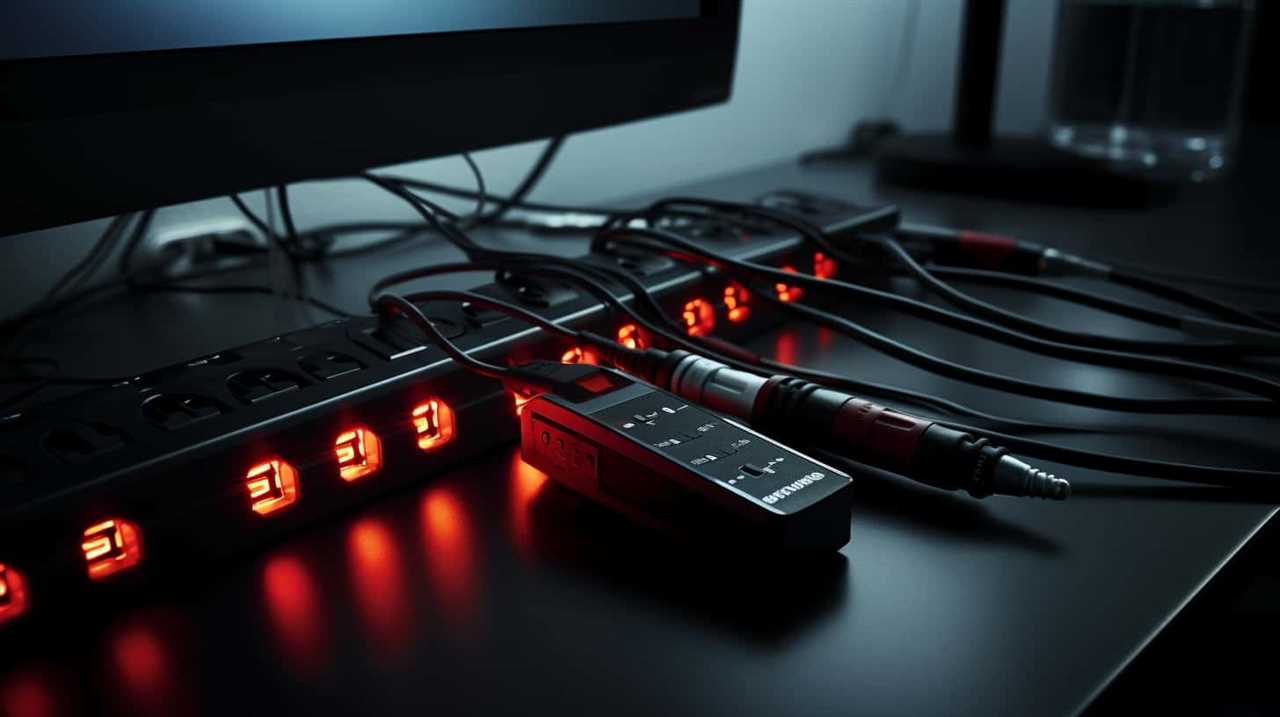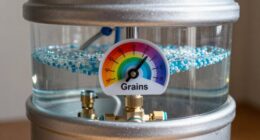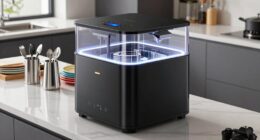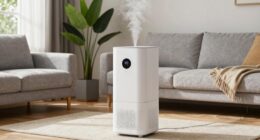Are you prepared to explore the complexities of tax deductions for household appliances?
Just like a navigator charting a course, we will guide you through the eligibility criteria, types of appliances that can be deducted, and the importance of keeping receipts.
With our precise calculations and required documentation, you’ll be well-equipped to maximize your appliance deductions.
Join us on this journey towards mastery of the tax code and make the most of your tax savings.

Key Takeaways
- Appliances must be used predominantly for business purposes and directly contribute to the production of income in order to be eligible for deductions.
- Energy efficient appliances can be deducted and may also qualify for tax credits.
- Proper documentation, such as receipts and records, must be maintained to substantiate deductions and comply with tax regulations.
- There are limitations and restrictions on appliance deductions, including maximum deductible amounts and eligibility criteria that must be met.
Understanding Tax Deductions for Appliances
We can explain the tax deductions available for appliances. Understanding tax benefits and claiming appliance expenses can be complex but rewarding for those who seek to maximize their deductions.
When it comes to claiming appliance expenses, it’s important to understand that not all appliances are eligible for tax deductions. The IRS has specific criteria that must be met in order to qualify for these deductions.
First, the appliance must be used for business purposes, such as in a rental property or home office. Additionally, the appliance must have a useful life of more than one year. Finally, the cost of the appliance can’t be deducted all at once, but must be depreciated over its useful life.
By understanding these requirements, individuals can confidently claim their appliance expenses and maximize their tax deductions.

Now, let’s delve into the eligibility criteria for deducting appliances.
Eligibility Criteria for Deducting Appliances
To be eligible for deducting appliances on taxes, we must meet specific criteria set by the IRS. This involves calculating deductions and claiming tax benefits based on the qualifying criteria. The IRS allows deductions for appliances that are used for business purposes or for the production of income. Personal appliances do not qualify for deductions. The table below summarizes the eligibility criteria for deducting appliances:
| Criteria | Eligibility |
|---|---|
| Business Use | The appliance must be used predominantly for business purposes. |
| Income Production | The appliance must directly contribute to the production of income. |
| Depreciation | The appliance must be depreciated over its useful life. |
| Documentation | Proper documentation, such as receipts and records, must be maintained. |
Types of Appliances That Can Be Deducted
We frequently deduct appliances that meet the eligibility criteria for business use or income production.
When it comes to types of appliances that can be deducted, it’s important to consider tax benefits and energy efficiency. Energy efficient appliances are highly recommended as they not only help reduce utility bills but also qualify for tax credits and deductions. These appliances include refrigerators, dishwashers, washing machines, dryers, and HVAC systems that meet the Energy Star requirements.

Additionally, appliances used exclusively for business purposes, such as computers, printers, and office equipment, can also be deducted. By investing in energy efficient appliances and utilizing them for business or income generation, individuals can maximize their tax benefits.
Transitioning into the next section, it’s crucial to keep receipts as proof of purchase and eligibility for deductions.
The Importance of Keeping Receipts
Keeping receipts is essential for maximizing tax benefits when deducting appliances on taxes. The importance of record keeping can’t be overstated, as it plays a crucial role in substantiating your deductions and ensuring compliance with tax regulations.
Without proper documentation, you run the risk of facing potential consequences, such as having your deductions disallowed or being subject to audits and penalties. By keeping receipts, you provide evidence of your purchases and demonstrate that the expenses were directly related to your business or rental property.

This level of detail is necessary to support your claims and avoid any doubts or challenges from the tax authorities. Remember, even if you think an appliance is clearly deductible, without the receipts, you may be unable to prove it.
How to Calculate Deductions for Appliances
When calculating deductions for appliances, it’s important to consider the specific criteria and guidelines set forth by the tax authorities. To accurately calculate deductions, follow these steps:
- Determine the eligible appliances: Not all appliances are eligible for deductions. Ensure that the appliance meets the necessary requirements, such as being used for business purposes or being energy-efficient.
- Calculate the depreciation: Deductions for appliances are usually claimed over their useful life, which is determined by the tax authorities. Calculate the depreciation amount based on this useful life.
- Keep track of maintenance costs: Deductions may also be claimed for maintenance and repair costs incurred for the appliances. Maintain accurate records of these expenses to support your claim.
Documentation Required for Appliance Deductions
To claim deductions for appliances on our taxes, we need to gather the necessary documentation. Understanding IRS guidelines is crucial to ensure we meet all the requirements.
The first step is to keep all receipts related to the purchase and installation of the appliances. These receipts should clearly indicate the cost of the appliances and any associated expenses, such as delivery or installation fees. Additionally, we should retain any manufacturer’s certification or Energy Star labels that demonstrate the energy efficiency of the appliances.

It’s essential to avoid common mistakes when documenting appliance deductions. One common mistake is failing to keep accurate records of the purchase and installation costs. Another mistake is claiming deductions for appliances that aren’t eligible under IRS guidelines.
Limitations and Restrictions on Appliance Deductions
When it comes to deducting appliances on taxes, there are certain limitations and restrictions that need to be considered.
One key limitation is the eligible appliance types that can be deducted, which typically include energy-efficient appliances.
Additionally, there’s a maximum deductible amount that taxpayers can claim for their appliances.

Understanding these limitations and restrictions is crucial for accurately claiming appliance deductions on taxes.
Eligible Appliance Types
We can deduct certain types of appliances on our taxes, but there are limitations and restrictions on which appliances are eligible. When it comes to home appliance deductions, the IRS has specific criteria that must be met.
Here are three types of appliances that may be eligible for deduction:
- Energy efficient appliances: The IRS encourages the use of energy-saving appliances by allowing deductions for their purchase. These appliances typically have an ENERGY STAR certification and are designed to consume less energy, reducing both utility bills and environmental impact.
- Medical appliances: Some medical appliances, such as air purifiers, humidifiers, or air conditioners prescribed by a doctor for a specific medical condition, may qualify for deductions. These appliances must be deemed necessary for the individual’s health and well-being.
- Work-related appliances: If an appliance is necessary for carrying out your job or profession, you may be able to deduct its cost. This can include equipment like computers, printers, or specialized tools required for your work.
Remember to consult a tax professional or refer to IRS guidelines for specific eligibility requirements and limitations when deducting appliances on your taxes.

Maximum Deductible Amount
There are limitations and restrictions on the maximum deductible amount for appliance deductions on our taxes. It is important to understand these limitations in order to maximize our tax savings. The deductible amount for appliances is subject to certain rules and regulations set by the Internal Revenue Service (IRS). To help you better understand these limitations, here is a table summarizing the maximum deductible amount for appliance deductions:
| Appliance Type | Maximum Deductible Amount |
|---|---|
| Refrigerator | $500 |
| Washer/Dryer | $300 |
| Dishwasher | $200 |
As you can see, the maximum deductible amount varies depending on the type of appliance. It is crucial to keep receipts and documentation to support these deductions. Remember, the deductible amount can only be claimed if the appliances are used for business or rental purposes. By adhering to these limitations and restrictions, we can maximize our tax savings and ensure compliance with IRS regulations.
Special Considerations for Home Office Appliances
When it comes to home office appliances, there are a few special considerations to keep in mind.
First, you need to determine if the appliances you’re using for your home office are eligible for deductions.

Second, you should understand the depreciation rules for these appliances, as they may impact the amount you can deduct.
Lastly, be sure to keep thorough documentation of your appliance expenses to support your deductions in case of an audit.
Eligible Appliance Deductions
For eligible appliance deductions, special considerations need to be made for home office appliances. When calculating deductions for these appliances, it’s important to understand the tax benefits that may be available. Here are three key points to keep in mind:
- Usage percentage: Determine the percentage of time the appliance is used for business purposes versus personal use. This will help you determine the portion of the appliance’s cost that can be deducted.
- Qualifying criteria: Ensure that the appliance meets the specific criteria set by the IRS for business deductions. For example, appliances used solely for business purposes may qualify for a deduction, while those used for both personal and business purposes may have limitations.
- Documentation: Keep detailed records of the appliance’s purchase price, installation costs, and any repairs or maintenance expenses. These records will be crucial when claiming deductions and supporting your tax return.
Considering these factors will help you maximize your eligible appliance deductions and take advantage of the tax benefits available.

Now, let’s move on to discussing the depreciation rules for appliances.
Depreciation Rules for Appliances
We can deduct a portion of the cost of home office appliances by following the depreciation rules set by the IRS. Depreciation is the process of deducting the cost of an asset over time to reflect its decreasing value.
The IRS has established specific depreciation rates for different types of assets, including appliances. The depreciation rate for appliances used in a home office is determined by their useful life, which is typically five years. This means that we can deduct a portion of the cost of home office appliances each year for five years.
However, it’s important to note that the tax implications of depreciation can vary depending on individual circumstances. Therefore, it’s advisable to consult with a tax professional to ensure compliance with IRS regulations and to maximize the tax benefits of appliance depreciation.
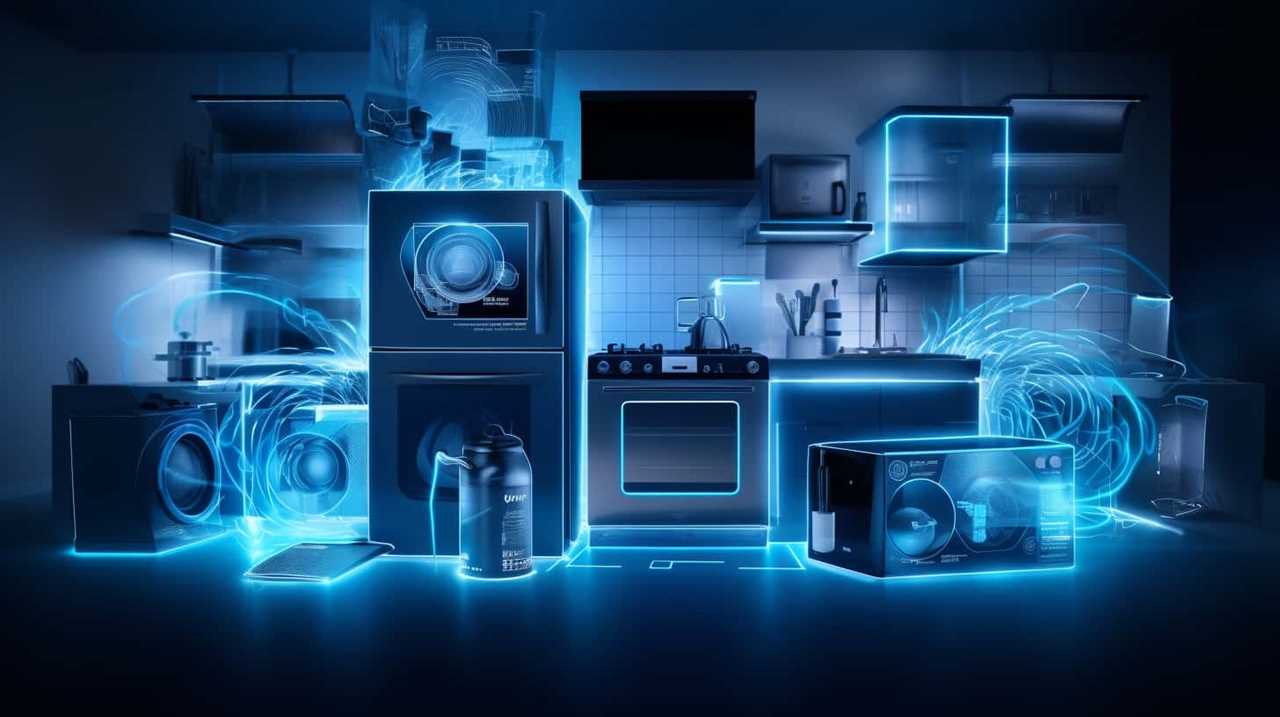
Documentation Requirements for Deductions
To meet the documentation requirements for deducting home office appliances, certain documents need to be maintained. These records are crucial in demonstrating the legitimacy of the deduction and ensuring compliance with the audit process.
Here are three essential items to include in your documentation for home office appliance deductions:
- Purchase Receipts: Keep copies of all receipts for the appliances bought for your home office. These receipts should clearly show the date of purchase, the item description, and the cost.
- Depreciation Schedule: Maintain a detailed depreciation schedule for each appliance. This schedule should include the initial cost of the appliance, the depreciation method used, and the annual depreciation expense.
- Usage Log: Keep a log that tracks the usage of each appliance in your home office. This log should record the date, duration, and purpose of each use.
Tips for Maximizing Appliance Deductions
One key strategy to maximize appliance deductions is by carefully documenting all eligible purchases.
When it comes to maximizing tax benefits, timing your appliance purchase can make a significant difference. Consider purchasing appliances at the end of the year to take advantage of year-end sales and promotions.

Additionally, keep an eye out for any tax credits or incentives that may be available for energy-efficient appliances. These credits can further increase your deductions.
It’s also important to review the tax laws and regulations to ensure that you’re eligible for deductions on appliances. Consult with a tax professional who can provide guidance on the specific deductions available to you.
Frequently Asked Questions
Are All Appliances Eligible for Tax Deductions or Are There Specific Criteria?
Appliances can be eligible for tax deductions, but specific criteria apply. For example, tax deductions for energy efficient appliances and home office appliances may be available. These deductions require meeting certain qualifications and documentation.
Can I Deduct the Full Cost of an Appliance or Only a Portion of It?
Yes, you can deduct the full cost of an appliance if it is used solely for business purposes. However, if it is used for both personal and business use, you can only deduct a portion of the cost.

Is There a Minimum Value Requirement for an Appliance to Be Eligible for Tax Deductions?
There is no specific appliance value threshold for deductible appliances. The eligibility for tax deductions depends on various factors such as the nature of the appliance and its use for business or personal purposes.
Can I Deduct the Cost of Appliances Used for Both Personal and Business Purposes?
Yes, you can deduct the cost of appliances used for both personal and business purposes. However, it is important to determine the percentage of the appliance’s cost that can be deducted for business use.
Are There Any Limitations on the Number of Appliances That Can Be Deducted in a Single Tax Year?
There are limitations on the number of appliances deductible in a single tax year. To calculate the deductible amount, we must consider the proportion of business use versus personal use for each appliance.
Conclusion
In conclusion, understanding the eligibility criteria, types of appliances that can be deducted, and keeping proper documentation are essential when deducting appliances on taxes.

However, it’s interesting to note that according to recent statistics, only 7% of taxpayers take advantage of appliance deductions, missing out on potential savings.
By maximizing appliance deductions, taxpayers can potentially lower their tax burden and increase their overall savings.



